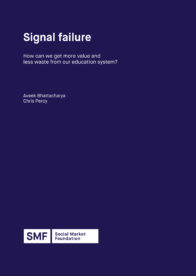This paper discusses the issue of signalling in education – the possibility that some forms of education may do little directly to improve learners’ skills and effectiveness, but may be used primarily to demonstrate or ‘signal’ their pre-existing traits or ability.
The extent and significance of signalling in our education system is strongly contested. However, the near certainty of at least some signalling, combined with the vast resources invested in education, means that billions of pounds and years of students’ lives are at risk of being wasted in an individual arms-race to demonstrate pre-existing talent that does little to improve productivity.
The purpose of this paper is to consider how to reduce waste in the education system. Instead of seeking to resolve the debate over whether signalling exists, we ask how we might go about limiting its negative consequences without sacrificing its benefits. We suggest three complementary ways forward for policy:
- Risk mitigation
- Structural change
- Improving our understanding of signalling
This paper represents a first tentative step in our efforts to grapple with the problem of how to mitigate the more wasteful aspects of signalling in the education system. As an immediate next step, we would like to invite interested parties and experts to get in touch with the Social Market Foundation, to help assemble a community of the willing to explore these topics, to understand what further we can learn from current data or practice, and to develop policy options

